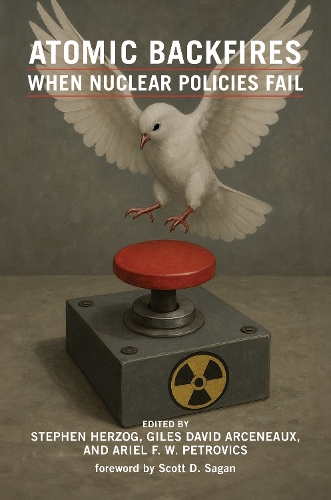
Atomic Backfires: When Nuclear Policies Fail
(Paperback)
Publishing Details
Atomic Backfires: When Nuclear Policies Fail
By (Author) Stephen Herzog
By (author) Giles David Arceneau
MIT Press Ltd
MIT Press
13th January 2026
United States
Classifications
Physical Properties
Paperback
448
Width 156mm, Height 235mm
Description
A sobering edited volume on how efforts to reduce nuclear weapons dangers may sometimes wind up exacerbating them. A sobering edited volume on how efforts to reduce nuclear weapons dangers may sometimes wind up exacerbating them. The existential risks posed to the world by nuclear weapons are growing. Efforts to halt nuclear proliferation, manage crises, promote arms control, and build alliances are all considered fundamental to reducing the likelihood of nuclear catastrophe. Yet, no tool is guaranteed to succeed and some may even have unanticipated, counterproductive consequences for international security. In a field fixated on finding solutions, Atomic Backfires, edited by Stephen Herzog, Giles David Arceneaux, and Ariel Petrovics, provocatively takes the opposite tack. An impressive group of contributors calls for close scrutiny of "standard operating procedures" in nuclear politics. They warn decision-makers, scholars, and students not to lose sight of the drivers and often calamitous effects of failed nuclear policies. The volume's authors aim to provide insights for navigating the difficult nuclear choices pursued in Washington, D.C. and other capitals around the globe.
Author Bio
Stephen Herzog is Professor of the Practice at the James Martin Center for Nonproliferation Studies of the Middlebury Institute of International Studies at Monterey. He is also Associate of the Project on Managing the Atom of the Harvard Kennedy School's Belfer Center for Science and International Affairs. Giles David Arceneaux is Assistant Professor at the Center for National Security and Foreign Affairs of the Howard H. Baker Jr. School for Public Policy and Public Affairs at the University of Tennessee. Ariel F. W. Petrovics is Assistant Research Scholar at the Center for International and Security Studies at Maryland of the University of Maryland School of Public Policy. She is also Non-resident Fellow at the Quincy Institute for Responsible Statecraft.
